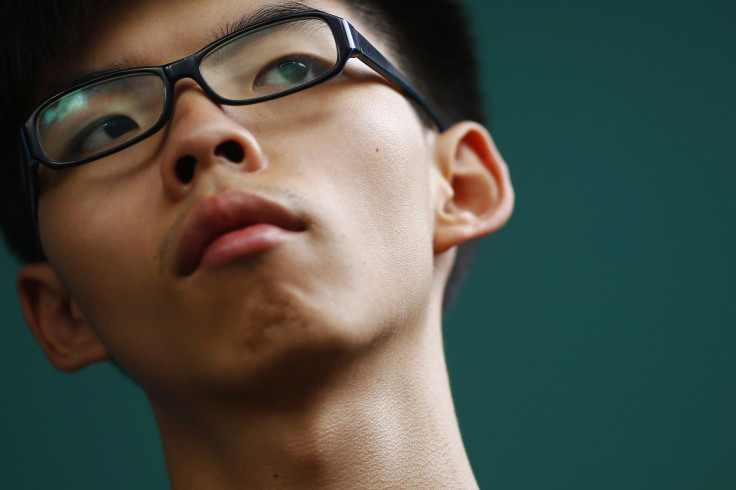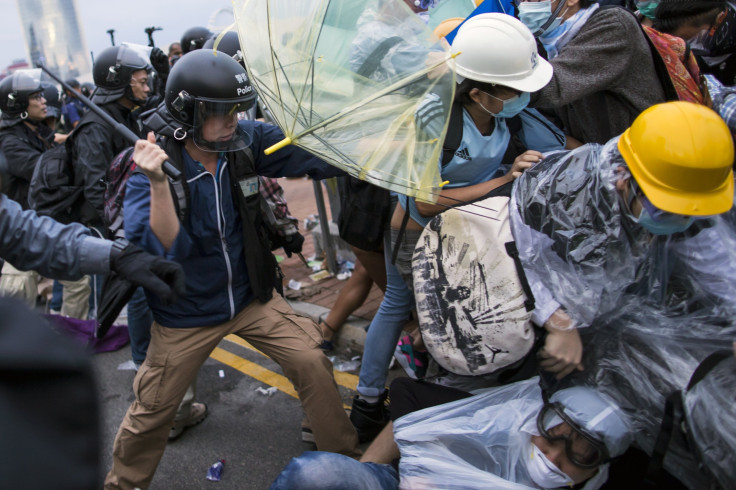Occupy Central Update: Hong Kong Student Leaders On Hunger Strike, Government Vows 'Resolute Action' To Clear Protesters

Joshua Wong, a Hong Kong student leader of the Occupy Central movement, announced Monday he and two others would stage a hunger strike until Hong Kong Chief Executive CY Leung agrees to a new round of talks with protest leaders over universal suffrage in the semi-autonomous Chinese city. “The values [Hong Kong residents] hold so dear -- equality, freedom and justice -- have all been ebbed away and destroyed,” a letter announcing the hunger strike said. “We have no other way when facing a broken government but to let go our bodily desires.”
The announcement came via Facebook a day after one of the most violent nights of clashes between Occupy Central protesters and police since the beginning of the movement nine weeks ago. Some protesters said, however, they weren’t such action would have an effect.
“Actually, I'm not very encouraged [by] the hunger strike since I don't think it would be very effective,” said John Lo, an Occupy protester quoted by Reuters. Lo called such action a mere "symbol," adding other actions taken by demonstrators in the past two months have not produced a positive government response.
The 18-year-old leader of Scholarism is joined by Isabella Lo, 18, and Prince Wong, 17. He and Lester Shum, leader of the Hong Kong Federation of Students, were arrested last Wednesday as part of a police operation to clear protester-made barricades in Mong Kok, one of the most contentious protest sites in the city.
“Living in these troubled times, there is a duty,” the statement continued, according to Agence France-Presse. “Today we are willing to pay the price, we are willing to take the responsibility. … Our future -- we will take it back.
Frustrations grew Sunday among protesters, who have thus far failed to get any sort of concessions from the Hong Kong or Beijing leadership. Leaders of the HKFS urged protesters to storm government buildings in the Admiralty district, a main organizing area for Occupy Central. Police used tear gas and water cannons to keep protesters away from the buildings. Forty protesters were arrested and 17 police officers were injured, according to the Associated Press. See pictures here.

Alex Chow, secretary-general of the HKFS, admitted it was a mistake while Leung said police would take “resolute action” to put an end to the movement and urged protesters to stay away from the main protests sites after Sunday’s violent clashes. He said some people "have mistaken the police’s tolerance for weakness" but did not say when police would make their next move to clear protest sites.
The once-popular protest movement that drew hundreds of thousands of protesters to the streets of Hong Kong has sharply declined in popularity as the weeks of barricaded roads have taken their toll on everyday Hong Kong residents. One in four residents polled by the Hong Kong University’s Public Opinion Program want police to clear protesters out of their camps.
Now only a few hundred protesters maintain the four or so protest sites. One told AFP she and her colleagues were feeling “angry, tired and upset” Monday following the violence Sunday night.
© Copyright IBTimes 2025. All rights reserved.






















